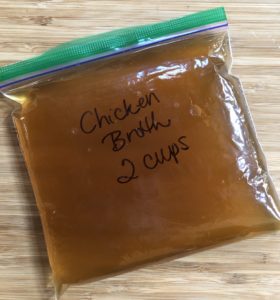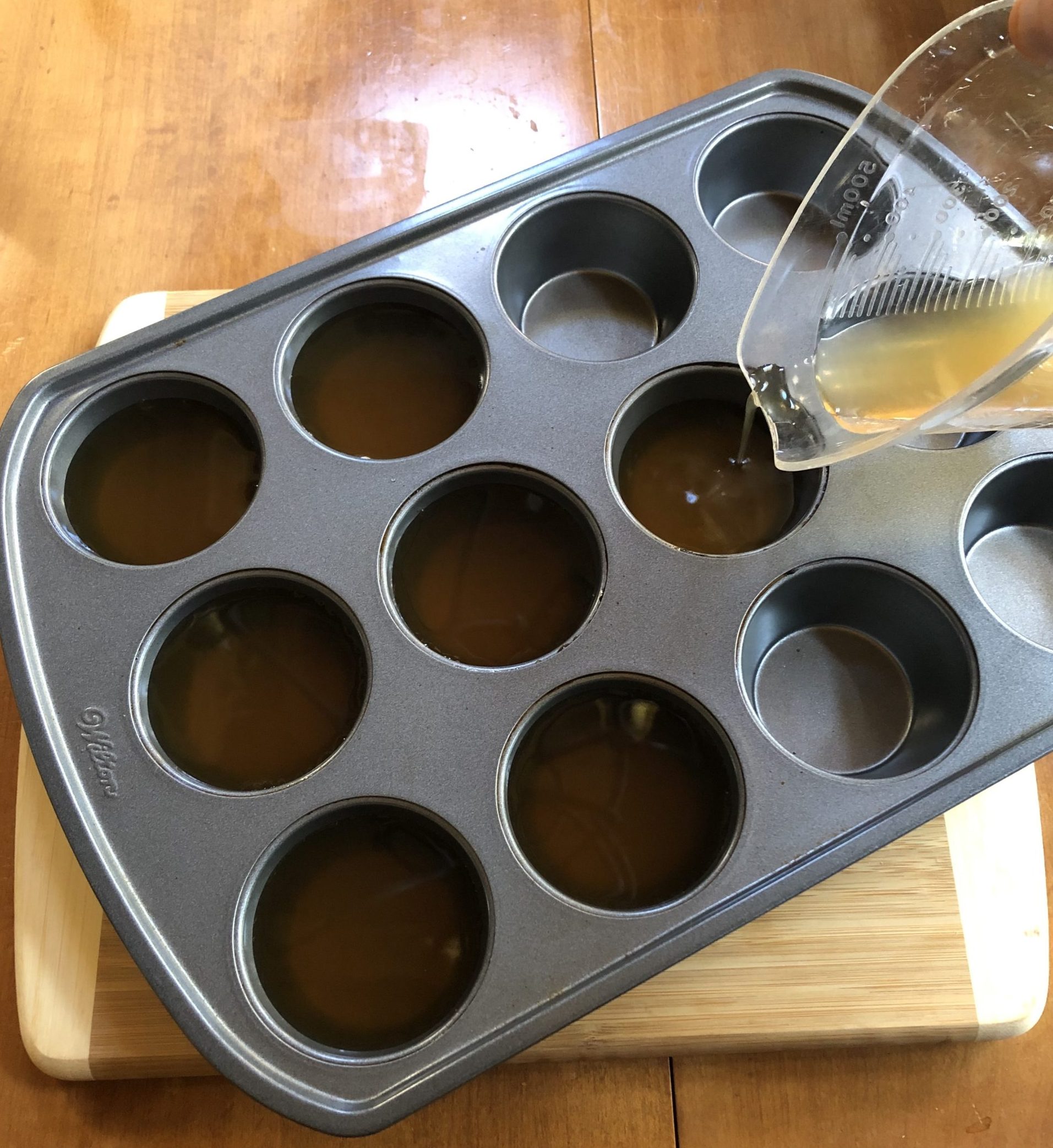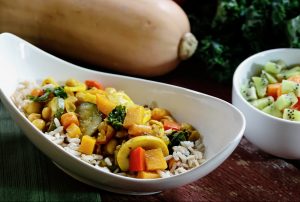 Which is the best broth to buy?
Which is the best broth to buy?
Is homemade broth really better than store-bought?
We receive quite a few questions about chicken broth and vegetable broth, and these are just a couple of examples, so if you have thought these same things, rest assured, others have too!
Broth is an important ingredient in many types of meals. Of course, it adds amazing flavor to soups and stews, and it also adds great flavor to grains (like couscous, rice, quinoa or risotto), sauces and all kinds of vegetable dishes. It's also a great "go to" option when you need to deglaze your pan.
First, what's the difference between broth and stock?
 While there are some differences, you will get different answers from different people. Many will say stock is made using bones only...no meat, seasonings, vegetables or other ingredients.
While there are some differences, you will get different answers from different people. Many will say stock is made using bones only...no meat, seasonings, vegetables or other ingredients.
Broth, on the other hand, is made using meat, vegetables, seasonings and other ingredients. For this coaching tip, we are simply using broth to refer to both broth and stock.
So, if good broth is so important, what's the best type of broth to use?
We will be honest, we prefer homemade broth. Trust us, this is not a "Martha Stewart" thing...you can let the slow cooker do the work while you sleep, and then wake up to homemade broth! We have found the flavor is much better, plus the nutrients are superior to the store-bought versions.
A few years ago, we made a chicken noodle soup using homemade broth and it was incredible! Our parents went on and on about the incredible flavor! The next time we made it, we were short on time and used a store-bought broth...the result wasn't near as flavorful. That was our real awakening to the depth of flavor homemade broth can add.
There are, of course, other trade-offs when it comes to homemade vs. store-bought broth...
 Scraps and bones! Homemade broth is a great way to make use of scraps and bones from leftover chicken/turkey or scraps from vegetables. Simply throw your scraps in a large plastic bag in the freezer and, when you have enough, it is easy to use them for a flavorful broth.
Scraps and bones! Homemade broth is a great way to make use of scraps and bones from leftover chicken/turkey or scraps from vegetables. Simply throw your scraps in a large plastic bag in the freezer and, when you have enough, it is easy to use them for a flavorful broth.- Cost. If you use your scraps and bones, homemade broth can be much cheaper!
- Convenience. If you haven't made your own broth in advance, this is where store-bought broths definitely have the edge. There are many different types of store-bought broths that come in cans, cartons, bouillon cubes and granules. The key with store-bought broths is to READ THE INGREDIENT LABEL! Most broths have additives for flavor, thickening and other reasons. Some broths use MSG as a flavor enhancer. We have found a granular broth base and seasoning (Orrington Farms) that we like to use when we don't have the homemade variety available. The best part about the granules is you can measure the exact amount you need and avoid those leftover cartons from going bad in the fridge.
 Nutrition. Homemade broths tend to be higher in nutrients. They are also lower in sodium and, of course, you can control the sodium even more by adjusting the amount of salt you use.
Nutrition. Homemade broths tend to be higher in nutrients. They are also lower in sodium and, of course, you can control the sodium even more by adjusting the amount of salt you use.
Let the slow cooker do the work!
The slow cooker can be your best friend when it comes to making homemade broth extremely convenient! Cooked on low for 8-10 hours, you can create a fantastic flavored chicken broth using chicken wings, onion, water, garlic and salt. This can also be done on the stovetop by cooking on a low simmer for 4-5 hours...the key is low and slow! The chicken wings provide a great combination of meat to bones, resulting in a broth that is full of flavor.
DON'T YOU DARE THROW THOSE TURKEY BONES OUT!
Of course, you can also use your leftover scraps and bones -- and Thanksgiving is the perfect time to take advantage of all of those turkey bones and scraps! Save them after de-boning your turkey, toss them in the slow cooker, fill with water and cook on low 8-10 hours...you will have a mind-blowing flavorful broth ideal for these absolutely delicious recipes!
What about homemade vegetable broth?
Yet again, the magic can happen in the slow cooker! All it takes is some onion, celery, carrots, herbs, water and salt. Collecting your vegetable scraps and keeping them in a bag in the freezer (like celery stems, carrot peels, onion skins, green onion ends, mushroom stems and bell pepper scraps, among others) makes this very easy and convenient. It's a good idea to stay away from using cruciferous vegetables such as cabbage, broccoli and cauliflower...they can be too strong and overpowering. And, vegetables like brussels sprouts and turnips can leave a bitter flavor in the broth. Also, it is best not to use old or moldy vegetables...if you wouldn't eat it now, don't throw it in the scrap pile for your broth!
How do you store broth?
Broth will store well in the refrigerator for about 5 days (sometimes up to 1 week). This includes opened store-bought cartons and cans. After this time, bacteria can start to grow and, even if it doesn't make you sick, can affect the flavor of your meal.
Freezing is the key!
 You can freeze broth for up to 6 months (or 12 months in a deep freezer) before it loses its flavor. Here are some tricks to storing broth in the freezer:
You can freeze broth for up to 6 months (or 12 months in a deep freezer) before it loses its flavor. Here are some tricks to storing broth in the freezer:
- Conserve freezer space by storing broth flat in quart size plastic bags. Remember to label and date the bag! This will not only save space, but then the broth can be thawed easily by dipping the bag in warm water when ready to use.
- Consider the amount - storing the broth in plastic bags or containers in 1-2 cup increments will make it much more convenient to thaw and use in your recipe.
- Muffin pan measuring...pouring the broth in a standard muffin pan will give you 1/2 cup servings. Since you won't want to keep your muffin pan in the freezer, once frozen, pop the frozen broth out of the pan and place the frozen sections in a plastic bag.
- Ice cube trays will hold about 2 Tbsp in each opening which works great for smaller portions. Like the muffin pan, once frozen, pop out the broth cubes and store them in a
 freezer plastic bag.
freezer plastic bag.
Once you have your homemade broth ready, here are just a few great ways to use it:
Southwest Quinoa with Simple Guacamole
Spicy Peanut Sweet Potato Soup
Do you have tips, tricks and preferences when it comes to flavorful broth?
Please share with us!







Do you have herbs in your fridge or garden going bad. Pull them off the steam and put into ice trays like they were saying. Fill them up w/ broth or water and freeze them. When putting together your favorite soup or stew, pop them in your crock pot and now you have fresh herbs added to your recipe!